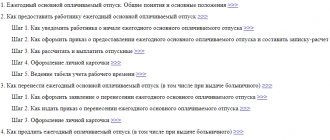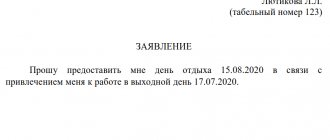Author of the article: Vladimir Danilevsky Last modified: January 2021 69203
Leave due to the death of a relative is a necessity for a citizen who has lost a loved one. During this time, you need to do a lot of important things, say goodbye to your loved ones and put your thoughts in order before going to work. For an employer, providing days is not a right, but an obligation established by the Labor Code of the Russian Federation. Despite the clear regulation of the procedure, in practice conflicts still occur between the parties. Often the court intervenes in the matter. The article will describe in detail the nuances of providing leave in connection with the death of an employee’s relative, as well as issues that can be agreed upon by the employee and the employer.
Leave due to the death of a relative according to the Labor Code of the Russian Federation
Leave based on the death of a relative is issued under Article 128 of the Labor Code of the Russian Federation. The code does not provide an exact list of relatives in connection with whose funeral the employee is relieved of his work duties. Who is considered close relatives? The answer to this question is contained in Articles 2 and 14 of the RF IC. In particular, these are:
- Husband or wife.
- Natural or adoptive parents.
- Native and adopted children.
- Grandmothers and grandfathers.
- Grandchildren.
- Full and free brothers/sisters.
FOR YOUR INFORMATION! Is a worker entitled to leave in connection with the burial of a relative who is not close, or a person with whom there is no relationship?
From a legal point of view, no. However, the employer has the right to grant leave on his own initiative. In this case, a corresponding internal act is drawn up.
How long is the vacation?
How many days should an employee be given in the event of the death of close relatives? This is the most important moment for the leadership of the organization. On the one hand, you don’t want to prolong the employee’s absence; on the other hand, you should not violate his rights and allow him to fulfill his duty to the deceased.
Article 128 of the Labor Code of the Russian Federation provides for and stipulates this issue. According to legislative norms, time off should be issued in an amount of no more than five days. Analyzing production practice, we can say that most often such leave is issued for 3 days. Three days is not just a random number; in standard cases, this is exactly how long it takes to organize a funeral and bury a body. Usually the employee himself specifies the number of days of absence in his application. That is, he can take any duration without going beyond the boundaries of what is permitted under the Labor Code of the Russian Federation.
Collective agreements may also establish a different duration, but when establishing it, the employer must remember that he cannot reduce the terms prescribed in the Labor Code, but he can increase them.
Most often, the employees themselves try not to delay their time off even on such a sad occasion. The reason for this is that there is no fee for these days. Although the employee’s position is retained, as is his salary, all payments due under the established tariff or salary are not made. It should also be remembered that days taken in excess of the permitted limit may affect the total length of the working year and delay the entitlement to paid annual leave. This is possible if an employee has taken more days without pay in a year than required. According to labor legislation, for family reasons, that is, without compelling reasons, an employee can take no more than 14 days a year.
Design features
Leave is issued based on an application from the worker. It is acceptable to submit this document right before your vacation, since death is not something that can be planned. The application form is not established by law. When drawing up, you should focus on the standard form.
Application example
General Director of Prodvizhenie LLC I.V. Sidorov, promotion department manager A. S. Krylova
statement.
Please give me leave without pay from 07/06/2021 for 5 calendar days due to the death of my father.
07/05/2017
A.S. Krylova
How to apply correctly?
Based on the application, management issues an order to issue leave. In this case, either the enterprise template or the T-6 form is used. The paper does not need to specify the reason for the vacation, but it is necessary to indicate its start and end dates.
Management must also put the appropriate marks on the time sheet:
- OZ or 17 – leave due to the death of a relative, granted on the basis of the Labor Code of the Russian Federation.
- DO or 16/DB or 18 – leave due to the death of another person, granted on the basis of the employer’s decision.
Documents must be requested from the employee. In particular, you need a copy of the death certificate, documents confirming the relationship with the person (for example, a birth certificate). As a rule, these documents are provided after the vacation.
How to take time off or vacation
An employee who wants to either take full time off instead of vacation, or add additional days of non-working days to travel due to the death of a relative, has two options: available time off and vacation (additional or standard).
Time off will be considered the allotted time off for work on holidays and weekends. Since in most cases these are paid days, the employee will not lose money. To take a day off, you need to write an application, and it is better to do this in advance, because otherwise the day will be considered as absenteeism.
When filling out the application, you must indicate the reason in the main part. If a relative falls under the concept of “close”, then you need to refer to the article that provides the basis for the employer’s consent.
Vacation is also an option, but remember that it cannot always be taken at any time. For example, the following factors may influence:
We recommend you study! Follow the link:
The employee’s right to receive regular paid leave
- indispensability of the employee;
- frequent days off, sick leave;
- low labor productivity;
- being on probation;
- recent punishment for failure to comply with their duties.
However, in other cases, in order to take a vacation, you need to write an application. The application must indicate several points: the duration and number of vacation days required by the employee, and the reason.
But regardless of which method the employee chooses, the employer must assess the degree of indispensability and organize the work so that his absence does not affect the productivity of the entire department.
Paid leave for funerals
According to the Labor Code of the Russian Federation, leave in connection with a funeral is not paid. However, the employer is not prohibited from paying for missed days at his own discretion. In this case, a local act is drawn up. It can justify payments as follows:
“In the event of a relative’s funeral, the employee is granted a 3-day leave with pay.”
In this case, the employee can request another 5 days of unpaid leave. In such a situation, you need to draw up a second statement.
Funeral leave for military personnel

Military personnel are a special category of citizens who are not subject to all the laws and regulations that apply to civilians. But with regard to leave for the funeral of a close relative, they have even more attractive conditions. Contract and conscript military personnel are provided with up to ten days of rest in the event of the death or serious illness of a close relative. This status of a person is also determined by the family code.
Please note that the duration of the vacation can be increased if more travel time is needed. Conscripts and cadets are also provided with payment for travel to and from home if they wish to take advantage of compensation for this leave. The payment can be assigned for one vacation per year, with the exception of vacation vacations.
Labor legislation is a balance between the interests of the employee and the employer. If an employee needs additional days off in connection with the funeral of a close relative, then he has the right to take leave at his own expense. Management cannot refuse this leave, even if the request is submitted unexpectedly and it is difficult to find a replacement for the employee. Summarizing the maximum number of days allowed for the funeral of a close relative, let us clarify that we are talking about five days, but you can take less.
Material support
The law does not oblige companies to financially support an employee in the event of death. However, in practice, employees usually receive these payments. The need to provide material support must be stipulated in internal agreements. Let's consider the procedure for providing assistance:
- Receipt of an application from an employee with a corresponding request.
- Providing documents confirming relationship with the employee.
- Receipt of funds by the employee within the specified time frame. As a rule, this is 2 weeks from the date of death of a relative.
An employee can receive financial assistance along with his salary.
Application example
General Director of Prodvizhenie LLC I.V. Sidorov, promotion department manager A. S. Krylova
statement.
I ask you to provide me with financial assistance in connection with the death of my mother I.V. Krylova. I am attaching to my application a birth certificate confirming my relationship.
20.07.2017
A. S. Krylova
Reflection in the time sheet
The time worked by each worker is recorded in a special report card. The responsibility for maintaining such records rests with the head of the company. Accordingly, any changes in the work schedule must be recorded.
The mark must reflect the type of leave. That is, it would be correct to write “vacation without pay.” Since the timesheet is a kind of schedule, it will not be possible to enter entire phrases into it. For this reason, it is allowed to enter marks in the form of abbreviations, for example, “OBZ”.
Due to the fact that this is not defined by current legislation, the symbols of marks can be adopted by the company’s internal rules.
Governmental support
Upon the death of a relative, a person is also provided with state financial support. Social benefits are paid to the person who took responsibility for the funeral. You can receive funds through your employer or social security authorities. Social benefits are not taxed. Insurance premiums are also not deducted from them. To receive funds, you must contact your employer with an application within 6 months from the date of death.
Taxation
Financial assistance to an employee will not be subject to income tax. This rule is established by paragraph 8 of Article 217 of the Tax Code of the Russian Federation. However, this only applies to the death of close relatives: children, parents, spouses. In all other cases, income tax is not paid only if the deceased relative lived in the same apartment as the employee.
Insurance premiums are also not deducted from financial assistance. This is stipulated by Federal Law No. 212 dated July 24, 2009. Again, this only applies to deaths of spouses, children and parents. If, for example, a grandmother dies, it is recommended to pay insurance premiums.
Responsibility for refusal to grant leave
The employer does not have the right to refuse to grant leave to an employee, even if the application is submitted immediately before the issuance of days off from work. If the manager refuses the employee, he may be subject to administrative liability on the basis of Part 1 of Article 5.27 of the Code of Administrative Offenses of the Russian Federation:
- A fine of 1,000 - 5,000 rubles for individual entrepreneurs and officials.
- A fine of 30,000 - 50,000 rubles for legal entities.
Repeated violation of the law threatens even more serious consequences:
- 10,000-20,000 rubles for individual entrepreneurs and officials.
- 50,000-70,000 rubles for legal entities.
A fine is issued only if there is evidence of the employer’s guilt.
How many days are given according to Art. 128
The amount of leave required comes to the fore.
Especially in such cases:
- when you need to travel far;
- The trip itself takes quite a long time.
A simple example: an employee’s husband, who was working in the capital of the country or abroad, died. There won’t be any problems with the documents, but she needs time to get to the relative’s body. What she must do is regulated by the above law. The woman writes a statement (you can first discuss the current situation with the employer in words, but words are not enough), which will outline the essence.
The maximum number of days a person can be absent from work is 5 calendar days, even if these days fall on weekends or holidays. If necessary, these days can be increased by taking vacation after the weekend or days assigned to each employee as standard vacation.
What should an employee who is denied leave do?
What should an employee do if the employer does not allow leave due to a funeral? You should contact the labor inspectorate. However, a person going to a funeral has nothing to do with it. You can use the following algorithm:
- Drawing up an application for leave.
- Sending an application with confirmation of its acceptance (you need to take a copy of the document with a mark of its registration).
- An employee goes on leave without permission for the duration specified in the Labor Code of the Russian Federation.
In this case, the employer does not have the right to fire the employee. If he does this, the employee can apply to the labor inspectorate. You need to take with you a copy of the application requesting leave, a copy of the death certificate, copies of documents confirming the person’s relationship with the deceased. The employee can also apply directly to the court for his reinstatement at work. You will not have to pay a fee.
FOR YOUR INFORMATION! You need to understand that many disputes arise due to simple ignorance of the laws by both the employer and the employee. It is not recommended to immediately enter into confrontation with management. You should simply refer to the law that obliges the employer to provide leave. As a rule, at this stage all problems are resolved. It is rare that an employer will agree to enter into labor litigation.
Are days paid for the funeral of a loved one?
And now the financial side of the issue: those three days for the funeral according to the Labor Code will be paid or not - an important nuance. There are several reasons why it is normal for people in this situation to think about whether the vacation will be paid:
- Travel costs if you need to travel far to the funeral will be, if small, then definitely unforeseen by the family budget.
- Funeral costs - place, paraphernalia and traditions sometimes require large financial investments.
- Life after the funeral will continue, and in conditions of lack of money, a salary will be received slightly less than usual, because 3 working days have fallen out.
These factors should be taken into account when planning costs.
Leave given in connection with the death of a relative is not paid. Although the above family members are covered by the Labor Code of the Russian Federation, the employer can expand the list. However, an important point: he absolutely has no right to remove anyone from it. If a close relative has died, he is obliged to issue leave, but if a distant relative has died, then this is rather his right.
The employee's rights are also protected from a financial point of view. Thus, Article 9 of the Federal Law “On Burial and Funeral Affairs” takes into account the blow to the wallet that a relative of the deceased receives. The Social Insurance Fund pays benefits upon presentation of a death certificate.
It does not exceed a certain amount - 4,000, but will be different in different situations. In addition, in cities where salary calculation depends on the regional coefficient, the benefit will also depend on it, and therefore you should first find out about its availability.








